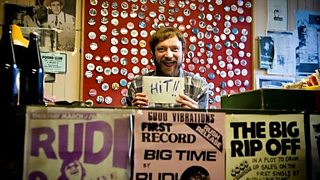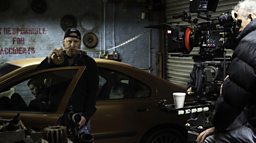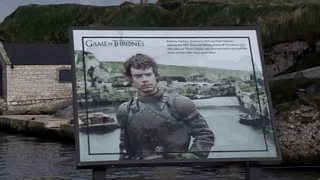Game changer: How the film industry came of age in Northern Ireland
By Peter Crutchley | 28 November 2014

Once considered an industry dead zone at the height of the Troubles, Northern Ireland is experiencing a boom in TV and film production, from global hits like Game of Thrones, to critically acclaimed indigenous features such as Good Vibrations.
The country’s film sector had little international profile just a decade ago. Now a special edition of The Arts Show on BBC Northern Ireland is focusing on an industry that is worth £329million. How did it experience this upturn in fortunes?

According to John Hill, Professor of Media at Royal Holloway, University of London, and author of Cinema and Northern Ireland, it has taken a long time to reach this point.
“Northern Ireland appeared in a number of newsreels and travelogues in the 1920s”, he says. “The first fiction features were made in the 1930s with films such as The Luck of The Irish and The Early Bird.
“Although it was hoped these films would lay the basis for a film industry, production proved to be erratic during the following decades.”
Films played an important role in raising morale during World War Two. The Unionist government was keen that film showed the country’s contribution to the war effort. No major feature was made, but a number of shorts were produced depicting life in Northern Ireland. Yet the industry’s progress remained slow.
“Due to its geographical location, small population and lack of infrastructure for production, Northern Ireland could not be said to have possessed a film industry for most of its history,” adds Prof Hill.
“Film crews did, however, occasionally visit to shoot on location, such as 1947’s Odd Man Out, which was one of the earliest attempts to reflect the political unrest in Northern Ireland.”
Political unrest and violence would continue to overshadow film in Northern Ireland with the outbreak of the Troubles in 1969. At this time the country was not an easy place in which to create cinema. Many productions dealing with the conflict were shot somewhere else.
The story of the Troubles has been a particularly difficult subject, tackled in films like 1975’s Hennessy and The Long Good Friday in 1979.
Troubles films were not regarded as a great box-office draw. Some were criticised for presenting depoliticised portraits of the conflict, while others attracted controversy from both Unionists and Nationalists for perceived political bias.
Local film production began to pick up in the 1980s, and gathered pace in the 1990s thanks to a string of new incentives.
“Momentum increased as result of the formation of the Northern Ireland Film Council [now Northern Ireland Screen], the availability of lottery funding, and BBC Northern Ireland’s involvement in production,” says Professor Hill.
“Crucially this coincided with the period following the announcement of the paramilitary ceasefires in 1994, and resulted in a burst of filmmaking activity, including Titanic Town and Divorcing Jack in 1998, and Mad about Mambo a year later.”


The Arts Show follows the Game of Thrones bus tour around filming locations in Northern Ireland.
The last decade has seen Northern Ireland become the base for a host of large-scale productions including HBO’s Game of Thrones, Dracula Untold and the BBC drama series The Fall. HBO executive Jay Roewe described the country as a "sleeping giant" for film production.
When I grew up, film and TV was what happened a million miles awayMark Cousins
Northern Ireland’s attraction for international productions looking for a film base in Europe is in part due to its beautiful rural locations and expanding creative talent pool, but financial considerations have been a key factor.
The high-end TV tax credit which began operating across the UK last year allows these big productions to claim back up to a quarter of their production costs. But Professor Hill believes it is vital the industry be allowed to grow locally too.
“While global productions bring undoubted economic benefits, they don’t necessarily speak to local culture in the same way as smaller indigenous films might.
“Good Vibrations shows, it’s still possible for this kind of film to get made, but the production of films and television dramas rooted in local culture are probably less common than they might be.”
Good Vibrations, released in 2013, tells the story of punk icon Terri Hooley who opened a record shop in 1970s Belfast, at the height of the Troubles. It secured funding from Northern Ireland Screen, the Irish Film Board, BBC Films and other sources.
Northern Irish director and film critic Mark Cousins is encouraged by the success of such independent film-making. He believes the journey the country’s film industry has made is remarkable.
“When I grew up, film and TV was what happened elsewhere, a million miles away,” he says. “Now it is something that we do. The means of production are ours for the first time in movie history.
“Northern Ireland is overachieving compared to other nations and regions of the UK. But it would be wrong to be complacent. A lot of what we are doing is servicing productions that have been originated elsewhere.”
While these big productions attract the headlines, Cousins says there are still lots of opportunities for local film-makers:
“The real stability comes when a place produces lots of ideas for film and TV itself," he adds. “People with ideas gain confidence when they see huge productions being made, and this will reap rewards for the next generation.”
“We are ahead in this way but the fertility needs to continue. That's why it's so good that we are teaching our kids about film and TV. That's how we lock in a future. There's never been a better time for those who want to make film and TV here.”
The Arts Show is on BBC Two Northern Ireland on Sunday 30 November at 19:00. It is available afterwards on BBC iPlayer.
The Arts Show

The Arts Show investigates Northern Ireland's film and television drama industry on BBC Two NI at 19:00 on Sunday 30 November. Available afterwards on iPlayer.

Discover the future of film in Northern Ireland as The Arts Show Introduces showcases the creative talent of the country's young film-makers
